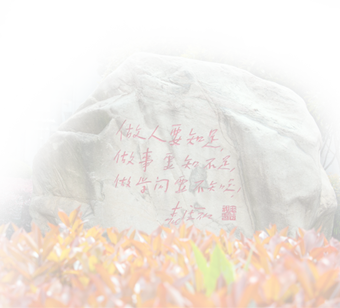


Tongji School of Pharmacy Clinical Pharmacy Practice Experience
Clerkship Syllabus
Goals and Objectives
The Clinical Pharmacy Practice Experience clerkship is designed for the 4th year international students in Tongji School of Pharmacy to familiarize hospital pharmacy operations and understand aspects of clinical pharmacy service in Chinese inpatient and outpatient settings.
After the 10-week clerkship, students are expected to achieve the following learning objectives:
1. Understand the role of hospital pharmacy administration;
2. Understand the role of pharmacists in Chinese healthcare system;
3. Understand the medication distribution system in both inpatient and outpatient pharmacy;
4. Understand the role of automation in improving work efficiency and decrease medication errors;
5. Understand concepts and application of therapeutic drug monitoring in practice of personalized medicine;
6. Understand concepts and application of pharmacogenomics in practice of personalized medicine;
7. Command 4 different classes of commonly used medications in Tongji hospital, including their names, mechanisms of action, pharmacokinetics, adverse effects and monitoring points, and apply these knowledge to individual patients;
8. Utilize tools to practice evidence-based pharmacy in order to provide drug information services;
9. Build written and speaking skills for effective communications with patients, families and other healthcare professionals;
10. Command pharmacotherapy for two diseases. For each disease topic, students should be able to:
l Explain the epidemiology, etiology, pathophysiology, diagnosis, treatment modalities, and prognosis of the disease in both professional and lay terms.
l Define goals of treatment for an individual patient.
l Design a therapeutic regimen consisting of both non-drug and drug elements appropriate for the individual patient. The selection of pharmacotherapy should be based on the specific patient’s age, disease, clinical condition, severity of illness, concomitant diseases, and other medications.
l Provide the patient and health care professionals with information regarding the mechanism of action, administration, and relevant adverse effects of the medications.
l Design a monitoring and follow up plan for each pharmacotherapy.
Clerkship Operation
Students will be divided into 4 groups (3 students in each group). A group leader will be elected and responsible for organizing group discussions, accomplish team projects, etc.
The 10-week clerkship will be divided into 6 blocks. The arrangements and pharmacy coordinator for each block is listed in Table 1.
Table 1. Clerkship operation schedule and project assignment
Block |
Time |
Learning Module |
Project |
Pharmacy coordinator |
1 |
Week 1 |
Pharmacy Administration and Operation |
Observations in pharmacy administration, outpatient and inpatient pharmacies, TDM and pharmacogenomics services |
Zhang Yang |
2 |
Week 2 |
Drug information |
Each group present one class of medications (see objective 7) in the PPT format |
Gui Ling |
Week 3 |
Patient education |
Every student submit one written assay of patient education points from a list of medications designated by the coordinator |
Zhang Wenting |
|
3 |
Week 4 |
Drug interaction and compatibility |
Given a complicated patient profile, be able to identify and solve potential drug interaction and compatibility issues, and each group give a formal presentation. |
Wang Zhen |
4 |
Week 5~6 |
Evidence-based medicine |
Given a pharmacotherapy-related question, search the literature and find the best evidence-based answer. Each member should submit a written assay |
Liu Jinyu |
5 |
Week 7~8 |
Pharmacotherapy |
Each group present a given disease topic and its pharmacotherapeutic approaches in the PPT format |
Wei Anhua |
6 |
Week 10 |
Rounding and conclusion |
Simulate rounding with physicians and providing pharmaceutical care as clinical pharmacy students; Final grading |
Zhang Chengliang |
In summary, each student is responsible to participate in three group projects (drug information, drug interaction, and pharmacotherapy) and present in at least one power point presentation. In addition, each student is expected to submit two written assays (evidence-based medicine and patient counseling)
Grading
Students will be graded based on their participation in the team projects, the quality and quantity of their assignments accomplished. The grading rubric is listed in Table 2.
Table 2. Grading rubric
Project |
Quantity |
Quality |
Total grade |
Active participation in team work |
10 |
15 |
25 |
PPT- drug interaction |
5 |
10 |
15 |
PPT- drug information |
5 |
10 |
15 |
PT- pharmacotherapy |
5 |
10 |
15 |
Wrritten assay- patient counseling |
5 |
10 |
15 |
Written assay- EBM |
5 |
10 |
15 |
100 |
|||
Management of clerkship
1. Organization and leadership
1.1 under the leadership of the dean's office, the implementation of the internship program is conducted by Tongji hospital and pharmacy school.
1.2 During clerkship practice, the teaching team is responsible for students' ideological and professional learning. Regular examination is needed to improve the quality of practice.
1.3 Students should respect the teachers, and often report works to the hospital teachers.
1.4 Students should strictly obey the hospital rules and regulations. Training hospital staffs are committed to teaching work; through words and deeds, cultivate students the correct medical style and treatment techniques.
1.5 The students should be strictly managed. Teachers should pay attention to the cultivation of students' professional ethics, basic theory and basic skills.
2. Clerkship rules
In the internship period, the students should consciously abide by the various rules and regulations, respect teachers, unite classmates, and take good care of public property. To establish the consciousness of serving patients with heart and soul, good medical ethics and strict work style, the students should work hard to fulfill the requirements of the internship program, consolidate and improve the basic theory, professional knowledge and basic skills. After the internship period, they can get preliminary training of scientific thinking methods and independent analysis of the problem, and the ability to solve the problem.
3. Leave system
Intern must strictly abide by the leave system. During the internship, the students should not ask for leave of absence except special circumstances. Due to special reasons to leave, he or she should be in accordance with the following application for leave procedures.
3.1 Less than 1 day, approved by the charge of the teaching of leadership;
3.2 More than 1 day but less than 3 days, approved by department of hospital teaching management;
3.3 More than 3 days, approved by department of hospital teaching management and tongji pharmacy school.